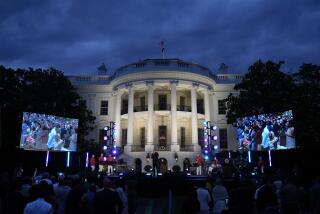Rebel Flag Rises Again as an Issue, in Bush Country
HOUSTON — Having sidestepped the question of whether the Confederate flag should fly atop the Capitol in the important primary state of South Carolina, Texas Gov. George W. Bush faces some potentially awkward decisions back home about whether Confederate symbols should be displayed on public property.
Bush, the front-runner for the Republican presidential nomination, has declared that South Carolina residents should be the only ones who decide the Confederate flag’s fate there. Outsiders, he added, should “butt out.”
But now his own state is requesting his opinion. In recent weeks, the Texas NAACP has asked Bush to support removing bronze Confederate plaques in the lobbies of the state’s Supreme Court and Court of Criminal Appeals. The school board in San Marcos, a college town near Austin, has also weighed in, asking him to ban display of the banner from public schools.
Looming next, said Texas NAACP President Gary Bledsoe, are the matters of two monuments to Confederates on the state Capitol grounds and the state’s Confederate Heroes Day, a holiday celebrated in Texas and eight other Southern states on Jan. 19, the birthday of rebel Gen. Robert E. Lee.
Whatever Bush does presents him with a dilemma: He can upset blacks, many of whom equate the Confederacy with slavery, and risk damaging his reputation as an inclusive Republican. He can anger partisans who revere the Confederacy as an important part of Southern history. Or he can stay completely out of the fray, reviving questions about his willingness to make tough decisions.
“He’s kind of in a box,” said Denne A. Sweeney, who heads the Texas division of the Sons of Confederate Veterans.
Bush’s gubernatorial office is issuing studiedly noncommittal replies as aides pointedly wonder why these issues are coming to a boil at this particular time.
“Throughout the Capitol complex, there are many historical representations of the six different governments that governed Texas in the past,” his press secretary, Linda Edwards, read over the phone Friday from Austin.
She was willing to list the six governments--Spain, France, Mexico, the Republic of Texas, the Confederacy and the United States--but when asked if Bush intended to retain the plaques and statues, she said, “I think the statement speaks for itself.”
The San Marcos school trustees’ president, Lupe Costilla, said Bush had not responded to her board’s Jan. 3 letter, which was prompted by complaints about a rival high school waving dozens of the flags during sporting events. But Bush’s correspondence director wrote to two private citizens: “The governor believes in local control.”
On the campaign trail, Bush was asked Wednesday about Confederate Heroes’ Day as he walked away from a news conference in Plaistow, N.H. “It’s part of our history,” Bush answered.
Other Texas holidays commemorate civil rights leader Martin Luther King Jr., Latino labor organizer Cesar Chavez and the emancipation of the slaves. To Bledsoe, the Confederate day is different: “The Confederacy may be a part of our history, but to many of us its symbols offend us in a very significant way.
“If some individual wants to honor his heritage, that’s your business,” he said. “But the Confederate battle flag is a symbol of slavery; it’s a symbol of division; it has been embraced by neo-Nazi groups. No public agency should be allowed to be divisive.”
Added James C. Harrington, director of the Texas Civil Rights Project: “It’s hard to reconcile any tribute to the Confederacy with the kind of population we have, the kind of history we have of oppression of African Americans.”
On the other hand, said Sweeney, of the Confederate descendants’ group: “I’m offended that Mr. Bledsoe is offended.” He wrote his own letter to Bush, accusing leaders of the National Assn. for the Advancement of Colored People of declaring “war on all Confederate symbols in a cynical attempt to enhance its own power base.”
He said he understands how African Americans might think Confederate celebrations smack of racism but insists that is a misconception. An example: Sweeney’s organization sponsored a Heroes’ Day rally a week ago, attracting a few hundred people to the Capitol grounds. The featured speaker was Kirk Lyons, an attorney who also has appeared at events sponsored by the white supremacist Aryan Nations, based in Idaho. “He said he had done work for black families,” Sweeney said. “He seemed very cordial to me.”
The plaques are in the court lobbies, he added, because the building was constructed, beginning in 1957, with money from the state’s Confederate Widows Fund. And the flags waved by John C. Hays High School result from the school team’s nickname: the Rebels.
The Confederate flag controversy flared in the presidential campaign when the GOP candidates were asked about it during a recent debate in South Carolina, which holds its primary Feb. 19. Bush and his major challenger in South Carolina, Sen. John McCain of Arizona, waffled their way around the issue--though Bush’s wife, Laura, did observe earlier this week that she does not believe the flag is racist.
Bush has stayed opaque in the past on Confederate history issues, Sweeney said. Two years ago, the Texas Senate declared April to be Confederate History Month; Bush didn’t veto the proclamation, nor did he sign it.
In 1998, he was listed as a donor to the annual fund-raising ball for the Museum of the Confederacy--the same year the Virginia institution honored Texas. At the event dancers in period costume twirled under dozens of Confederate flags hanging from the ceiling.
Edwards, Bush’s press secretary in Austin, said she has never heard Bush evince any special interest in the Civil War. Edwards did note that “he is a great admirer of Sam Houston.” When Texas voted to secede from the Union in 1861, Houston refused to take the state out and the Confederates removed him from the governorship.
*
Times staff writer Maria L. La Ganga in Iowa and researcher Sunny Kaplan in Washington contributed to this story.
More to Read
Sign up for Essential California
The most important California stories and recommendations in your inbox every morning.
You may occasionally receive promotional content from the Los Angeles Times.










